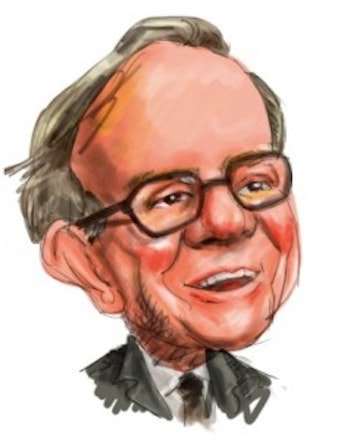While I certainly believe there are core principles upon which sound investments are made, it’s equally clear that, like snowflakes, no two investing strategies are exactly alike. Equally talented and accomplished investors can view the landscape of investment opportunity in precisely the opposite way. The strategy that best fits my personality is value investing combined with some simple but essential technical analysis tools.

In this series of posts I offer this collection of wisdom classified in specific fundamental investing topics:
Finding an Edge
Efficient Markets
So if the entire country became securities analysts, memorized Benjamin Graham’s Intelligent Investor and regularly attended Warren Buffett’s annual shareholder meetings, most people would, nevertheless, find themselves irresistibly drawn to hot initial public offerings, momentum strategies and investment fads. People would still find it tempting to day-trade and perform technical analysis of stock charts. A country of security analysts would still overreact. In short, even the best-trained investors would make the same mistakes that investors have been making forever, and for the same immutable reason – that they cannot help it.
Seth Klarman, 3.23.05
Human beings are subject to wild swings in their levels of fear, risk tolerance and greed. That won’t change. I base my whole approach on buying when others are fearful and selling when others are greedy. The reason Shakespeare is so relevant still today is that his plays were all about human nature, and human nature never changes.
Mark Sellers, 6.19.05
“Humans have a strong desire to be part of a group,” says Legg Mason equity strategist Michael Mauboussin in a 2004 research paper that dissects how investors make decisions. “That desire makes us susceptible to fads, fashions and idea contagions.”
On the behavioral-finance side, one of many inefficiencies comes from people anchoring on the past. People assume something is cheap, say, just because it hasn’t traded at such a low valuation for five or ten years. But that doesn’t matter, what matters is what will be.
Ric Dillon, 6.29.07
We always ask whether we ourselves have any competitive advantage in analyzing a particular company. Can we know the business better because no one else seems to be paying attention? Is the market’s view being distorted by some behavioral or structural bias that we don’t have?
Brian Bares, 9.30.08
Investors overreact to the latest news, which has always been the case, but I think it’s especially true today with the Internet. Information spreads so quickly that decisions get made without particularly deep knowledge about the companies involved. People also overemphasize dramatic events, often without checking the facts. It’s the classic, “Are more people killed each year by sharks or by being trampled by pigs?” type of situation – the dramatic event can get more play than it deserves. These types of overreactions are what we’re trying to take advantage of.
John Dorfman, 10.31.08
One way of dealing with information being more available is to stop playing the game and seek out securities or asset classes where there’s less information or competition.
Seth Klarman, 9.30.08
Wall Street’s view is that if you don’t make your projections, you’re a bad person. That’s because they don’t want to do the hard work of making their own projections to see if the company’s projections make sense.
Richard Pzena, 2.22.05
Wall Street sometimes gets confused between risk and uncertainty, and you can profit handsomely from that confusion. The low-risk, high-uncertainty [situation] gives us our most sought after coin-toss odds. Heads, I win; tails, I don’t lose much!
Mohnish Pabrai, 6.29.07
Concept of time
It’s still true that the biggest players in the public markets – particularly mutual funds and hedge funds – are not good at taking short-term pain for long-term gain. The money’s very quick to move if performance falls off over short periods of time. We don’t worry about headline risk – once we believe in an asset, we’re buying more on any dips because we’re focused on the end game three or four years out.
Jeffrey Ubben, 1.31.06
I like to talk about the long term with management because that’s how you really determine if someone is going to create business value. Most stocks are reasonably priced in the short term – it’s the long term where you’re most likely to put a different probability of something happening than someone else does. The human brain is incapable of conceptualizing something vastly different from what the situation is today. But the biggest-money ideas are those where the changes are far beyond what you can conceive today. The closer you can get to conceiving those types of changes and the higher the probability they might happen, the more likely you are to find big winners.
Lisa Rapuano, 9.28.05
Lack of visibility on timing is one of the best things you can have as an investor with a long time horizon. We love situations where it’s very difficult to model this year’s earnings.
Ken Shubin Stein, 2.28.06
Time is our friend. Today there’s so much money chasing quarterly performance or driven by program trading, index funds or ETFs. That leaves a real opportunity for fundamental investors like us who are looking out two to four years to find inflections in businesses which aren’t currently appreciated by the market.
Joe Wolf, 4.30.07
Time arbitrage just means exploiting the fact that most investors – institutional, individual, mutual funds or hedge funds – tend to have very short-term time horizons, have rapid turnover or are trying to exploit very short-term anomalies in the market. So the market looks extremely efficient in the short run. In an environment with massive short-term data overload and with people concerned about minute-to-minute performance, the inefficiencies are likely to be looking out beyond, say, 12 months.
Bill Miller, 6.19.05
Because enough people in the market think they’ll get fired for buying something that might be a year away from getting better, that provides real opportunity for people who aren’t worried about that.
Jeffrey Bronchick, 1.31.08
I’ve read that the average holding period on the New York Stock Exchange is nine months, which I don’t even consider investing. Over such a short period of time you’re just betting on the overall direction of the market or on the next quarterly earnings.
Aaron Edelheit, 1.31.08
We’re catalyst-driven on both the short and long sides, so we generally look out only one or two years for the thesis to play out. I was brought up in the business to be skeptical of big, long-term discounted cash flow models, so that’s not an important part of how we invest.
Steven Tananbaum, 9.28.07
Most investment institutions define success as having a good result in each and every discrete time period, so it’s quite logical that people in those institutions look to buy stocks that will do well from the current moment in time until, say, the end of the year. As a result, favorable occurrences such as positive earnings reports or value-realization events that are highly probable, but not likely to occur within the discrete time period, are discounted at a fairly remarkable rate. Those kinds of inefficiencies, if anything, are more common than they were when we started out 13 years ago.
Murray Stahl, 11.21.07
The most important change in my 40 years of investing has probably been in investors’ time horizons. Today the majority of investors – Ben Graham would call them speculators – are focused so closely on this week, this month and this quarter. Stocks are bought and sold on penny deviations from short-term estimates, which is mind-boggling. Crazy as it is, we can’t complain – it just creates more opportunities for investors with longer time horizons.
William Nasgovitz, 9.30.08
We have no problem buying things that take a long time to play out. Call me lazy, but I don’t want to worry about last week’s same-store sales or next week’s oil price.
Jeffrey Schwarz, 5.30.08
A[n] argument is made that there are just too many question marks about the near future; wouldn’t it be better to wait until things clear up a bit? You know the prose: “Maintain buying reserves until current uncertainties are resolved,” etc. Before reaching for that crutch, face up to two unpleasant facts: The future is never clear [and] you pay a very high price for a cheery consensus. Uncertainty actually is the friend of the buyer of longterm values.
Warren Buffett (quote from Forbes), 4.30.07
I have a ready answer when people ask me why I’m such a long-term investor, which is because I failed miserably as a short-term investor. I’m not against making money in the short term, I just don’t know how to do it.
Thomas Gayner, 12.21.07




